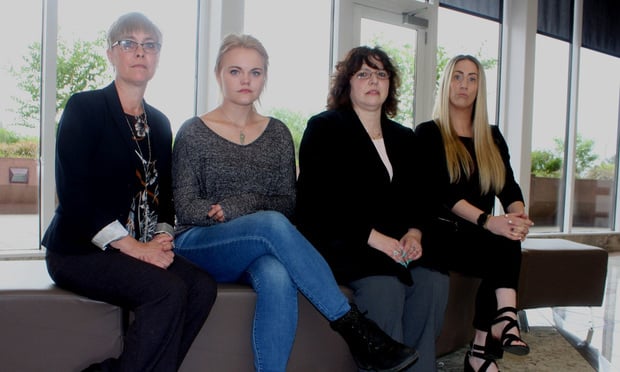Meet 4 Women Helping Connecticut Sue Big Pharma Over Opioid Addiction
Three families have become the face of opioid addiction in Connecticut.
May 24, 2019 at 03:27 PM
7 minute read
 Faces of the opioid crisis, from left to right: Paige Niver, Niver's daughter Brittany Niver, Lisa Christino, and Sarah Howroyd. Photo by Michael Marciano/ALM
Faces of the opioid crisis, from left to right: Paige Niver, Niver's daughter Brittany Niver, Lisa Christino, and Sarah Howroyd. Photo by Michael Marciano/ALM
Sarah Howroyd only stopped using OxyContin when she realized it was more expensive than heroin. So she switched narcotics, graduating from the prescription painkiller she once took to control pain after a car accident to an illegal street drug that would later cost her fiancé his life.
Like millions of Americans battling opioid addiction, Howroyd says she never imagined a medication she got from her doctor would cause her life to unravel, sending her spiraling into addiction.
Now, she is among four women helping Connecticut Attorney General William Tong lead the charge against Big Pharma, with a lawsuit accusing Purdue Pharma companies of intentionally misleading patients about their products' addictiveness.
Her litigation companions include a woman who started taking OxyContin and Vicodin as a child after her teeth were knocked out from a bicycle fall; and another whose son became addicted to opioids as a teenager.
Graduating to hard drugs
Like many people who abuse opioids, the women say they unknowingly found themselves on a dangerous road that started with doctors prescribing the drugs after an accident, only to find they or their loved ones soon needed stronger, illegal fixes.
In Howroyd's case, she'd grown up in Manchester in what she describes as a “Brady Bunch-type neighborhood.” She'd experimented with marijuana and alcohol while in high school, but not after, and thought she'd lived a charmed life with a fiancé she'd met while attending Boston University and he was an engineering major from a nearby college.
The couple did not know it at the time, but their lives changed forever following a 2005 car crash that left them with whiplash and neck pain. Both had the same primary care doctor, who put them on 120 milligrams of OxyContin, Purdue Pharma's brand of opioid-class painkiller.
“We were both on an amount way too high, but you had to take it everyday or else you'd have violent withdrawals,” according to Howroyd, who said the medical practice realized an error in the dosage after double-checking their prescriptions.
By then, two years had passed.
“We needed to be weened off and not kicked off, especially at that dose,” Howroyd said.
With their supply disrupted, the couple sought alternatives, and was soon buying heroin off the street. Howroyd, who blames the doctor and Purdue Pharma, said the experience was “horrendous.”
“It also affected our relationship and our ability to work,” she said.
By 2010, heroin use led the couple to split, but they dated on and off over the years. Howroyd believed that like her, her former partner had conquered addiction. But in 2016, while she was in a master's program for social work, she got a devastating call: He had died of an overdose.
“We had a lot of love for each other, but OxyContin brings out the worst in people,” Howroyd said.
Howroyd channeled her grief. She began the Manchester Hope Initiative with that town's police chief to divert opioid users to treatment, instead of jail. She soon became friends with families who shared similar stories. Some have since met with Department of Consumer Protection special investigator Caylee Yerkes-Ribeiro, who introduced them to Connecticut's attorney general, who in turn held an April 23 press conference with the women to announce the litigation against Purdue.
Danielle Lewis, spokeswoman for Perdue Pharma, and the company's press office did not respond to requests for comment at press time.
 From left to right are: Paige Niver, Niver's daughter Brittany, Caylee Yerkes-Ribeiro, a special investigator with the state Department of Consumer Protection, Lisa Christino, and Sarah Howroyd. Photo by Michael Marciano/ALM
From left to right are: Paige Niver, Niver's daughter Brittany, Caylee Yerkes-Ribeiro, a special investigator with the state Department of Consumer Protection, Lisa Christino, and Sarah Howroyd. Photo by Michael Marciano/ALM'I Lost Who I Was'
Meanwhile, the group of women supporting Tong's suit include Brittany Niver, who said she had excelled prior to opioid use. Niver said she was a 14-year-old student with grades among the top in her class when a bike accident sent her rushing to the emergency room. Her mother, Paige, said doctors prescribed several opioids to control pain during procedures to replace multiple lost teeth.
But what followed seemed like an overnight transformation.
“I was hospitalized several times for being violent. I was super mean and depressed,” said Brittany, now 24 and sober for three and a half years.
Her mother added, “Those years were the hardest of my life. I watched my child suffer a great deal on a daily basis. It destroyed our immediate and extended family relationship.”
The conflict was so intense, it culminated one Mother's Day in an incident that Paige Niver said took a toll on her health.
“I was hospitalized with heart palpitations,” she said. “I was stressed.”
Paige Niver put the blame squarely at the feet of Big Pharma.
“They knew the addictive qualities of their products,” she said. “As a mom, I didn't know. I was terribly uneducated about opioids. The doctors were prescribing opioids in droves to people in pain.”
For Brittany Niver, the bike accident became transformative. She said for four years after that she took OxyContin, then muscle relaxers and cocaine. She also used heroin for about a year.
“I lost who I was,” she said. “Before the accident, I never drank or smoked. … After the accident, I couldn't go one day without getting high.”
Brittany Niver hit rock bottom when a friend with whom she did heroin died of a drug overdose.
“I saw myself in that casket,” she said.
Her mother said Niver “sat on the grass outside after the wake and just balled and shook.”
It marked the end of a yearslong drug binge.
“I stopped everything completely,” Niver said.
'Heroin gave him that relief'
A fourth woman, Lisa Christino, also said opioids devastated her family, after her son, Brandon, got a prescription after an injury from running. Her son's doctors first prescribed OxyCodone, then Suboxone to curb his growing urges for the opioid. When that failed, Christino said her son sought a harder drug—street heroin.
“There was no tapering off, like there should have been,” she said. ”He was getting sick from the withdrawal from OxyCodone, and the heroin stopped him from being sick. Heroin gave him that relief he needed.”
Christino said her son was on heroin for about 18 months, but hid that from her until she confronted him.
“He told me he was afraid he was going to die,” she said. “It's definitely not something a mom wants to hear.”
The rock-bottom moment for her son came in 2017, when he fell asleep while driving and hit a pole. He survived the accident and started treatment. Christino has since joined the board of The Roadway of Hope, a nonprofit for recovering addicts.
She said, “It gives me a sense of satisfaction and hope that there is life beyond addiction.”
This content has been archived. It is available through our partners, LexisNexis® and Bloomberg Law.
To view this content, please continue to their sites.
Not a Lexis Subscriber?
Subscribe Now
Not a Bloomberg Law Subscriber?
Subscribe Now
NOT FOR REPRINT
© 2025 ALM Global, LLC, All Rights Reserved. Request academic re-use from www.copyright.com. All other uses, submit a request to [email protected]. For more information visit Asset & Logo Licensing.
You Might Like
View All

Pharmacies Accuse GoodRx of 'Inviting Price-Fixing' in Series of Antitrust Class Actions
4 minute read
Major Drug Companies Agree to Pay $49.1 Million to 50 States, Territories
3 minute read
Trending Stories
Who Got The Work
J. Brugh Lower of Gibbons has entered an appearance for industrial equipment supplier Devco Corporation in a pending trademark infringement lawsuit. The suit, accusing the defendant of selling knock-off Graco products, was filed Dec. 18 in New Jersey District Court by Rivkin Radler on behalf of Graco Inc. and Graco Minnesota. The case, assigned to U.S. District Judge Zahid N. Quraishi, is 3:24-cv-11294, Graco Inc. et al v. Devco Corporation.
Who Got The Work
Rebecca Maller-Stein and Kent A. Yalowitz of Arnold & Porter Kaye Scholer have entered their appearances for Hanaco Venture Capital and its executives, Lior Prosor and David Frankel, in a pending securities lawsuit. The action, filed on Dec. 24 in New York Southern District Court by Zell, Aron & Co. on behalf of Goldeneye Advisors, accuses the defendants of negligently and fraudulently managing the plaintiff's $1 million investment. The case, assigned to U.S. District Judge Vernon S. Broderick, is 1:24-cv-09918, Goldeneye Advisors, LLC v. Hanaco Venture Capital, Ltd. et al.
Who Got The Work
Attorneys from A&O Shearman has stepped in as defense counsel for Toronto-Dominion Bank and other defendants in a pending securities class action. The suit, filed Dec. 11 in New York Southern District Court by Bleichmar Fonti & Auld, accuses the defendants of concealing the bank's 'pervasive' deficiencies in regards to its compliance with the Bank Secrecy Act and the quality of its anti-money laundering controls. The case, assigned to U.S. District Judge Arun Subramanian, is 1:24-cv-09445, Gonzalez v. The Toronto-Dominion Bank et al.
Who Got The Work
Crown Castle International, a Pennsylvania company providing shared communications infrastructure, has turned to Luke D. Wolf of Gordon Rees Scully Mansukhani to fend off a pending breach-of-contract lawsuit. The court action, filed Nov. 25 in Michigan Eastern District Court by Hooper Hathaway PC on behalf of The Town Residences LLC, accuses Crown Castle of failing to transfer approximately $30,000 in utility payments from T-Mobile in breach of a roof-top lease and assignment agreement. The case, assigned to U.S. District Judge Susan K. Declercq, is 2:24-cv-13131, The Town Residences LLC v. T-Mobile US, Inc. et al.
Who Got The Work
Wilfred P. Coronato and Daniel M. Schwartz of McCarter & English have stepped in as defense counsel to Electrolux Home Products Inc. in a pending product liability lawsuit. The court action, filed Nov. 26 in New York Eastern District Court by Poulos Lopiccolo PC and Nagel Rice LLP on behalf of David Stern, alleges that the defendant's refrigerators’ drawers and shelving repeatedly break and fall apart within months after purchase. The case, assigned to U.S. District Judge Joan M. Azrack, is 2:24-cv-08204, Stern v. Electrolux Home Products, Inc.
Featured Firms
Law Offices of Gary Martin Hays & Associates, P.C.
(470) 294-1674
Law Offices of Mark E. Salomone
(857) 444-6468
Smith & Hassler
(713) 739-1250










